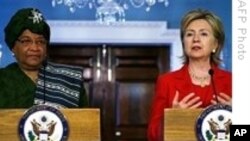<!-- IMAGE -->
Since its independence more than 160 years ago, Liberia has often been said to have a special relationship with the United States.
Now a new book by D. Elwood Dunn, professor of political science at the University of the South at Sewanee in Tennessee is calling on current and future Liberian leaders to revisit Liberia’s so-called historic relations and modernize it more toward regionalism and continental Africa.
In the book entitled “Liberia and the United States during the Cold War: Limits and Reciprocity”, Professor Dunn looked at Liberia’s relationship with the United States under three Liberian presidents – William V.S. Tubman (1944-1971), William R. Tolbert (1971-1980) and Samuel Doe (1980-1990).
Dunn argued that Liberia’s once ‘traditional’ relationship with the United States has begun to wane.
<!-- IMAGE -->
“One of the lessons that I draw looking at this Cold War period is that one has to now understand that the kind of interests that the United States had in Liberia during the Cold War period obviously has begun to change…and what we now must come to understand is that the first line of our pursuit of interests should be with our regional neighbors and then the continent of Africa,” he said.
He said Liberia should deal with the United States as a multilateral bloc of West African states or African states as a whole rather than based on what he called an outmoded special relationship.
Dunn said Liberia placed its diplomatic eggs in one basket and as a result was left disappointed when the United States abandoned Liberia during the country’s civil war.
He said the tens of thousands of lives lost during Liberia’s civil war could have been averted with what Dunn called a modicum of U.S. diplomatic capital.
Another lesson Dunn draws from his book is that a country’s foreign policy must always be in service to its domestic policy.
He said any government must have a governance agenda that speaks to the welfare and well being of the people it is called to serve.
Dunn said Liberia-U.S. relations during the Cold War were characterized by the pursuit of national interests by both countries.
“I think the way to characterize the relationship is that it was an exchange relationship, a kind of a quid pro quo…that is these two parties were pursuing their interests rather than the myth of special relationship that conventional wisdom had propagated,” he said.
Dunn said Liberia sought security and economic assistance as well as private investment from the United States.
On the other hand, he said the United States needed Liberia’s assistance to contain communism in Africa.
“What the United States wanted was support from Liberia in terms of its anti-communist crusade in Africa,” he said.
Dunn argued this desire to contain communism in Africa was the driving force behind the U.S. support for the military government of Samuel Doe because he said Doe had begun toying with the idea of turning to the East.
He said all three Liberian presidents used some kind of leverage as a way to get more U.S. assistance.
“You know that the United States had a number of facilities on Liberia territory – the Voice of America relay facility, the CIA listening post, the possible use of Roberts International Airport as an air force base if the need arose…so basically Liberia came to the table with these facilities as it sought its security and economic needs from the United Sates,” he said.
Dunn said that of the three Liberian Presidents during the Cold War, the administration of William V.S. Tubman (1944-1971) might have benefited the most from the Cold War relationship with the United States.
“Certainly one can say during the Tubman period, there was a very trusting relationship on the two sides. So I think one can say that Liberia benefited quite a bit during that period,” Dunn said.
On the other hand, Dunn said the relationship between Liberia and the United States during the Tolbert presidency (1971-1980) was marked by distrust because of Tolbert’s desire to move Liberia’s foreign policy more toward the developing Non-Aligned world.
Dunn said even though the United States provided significant financial assistance to the government of President Samuel Doe (1980-1990), such assistance did not benefit the Liberian people because he said Doe did not use it to effect tangible economic development.
Another lesson Dunn draws from his research is that a country’s foreign policy must always be in service to its domestic policy.
He said any government must have a governance agenda that speaks to the welfare and wellbeing of the people it is called to serve.
<!-- IMAGE -->




